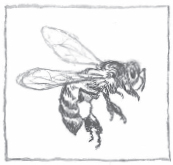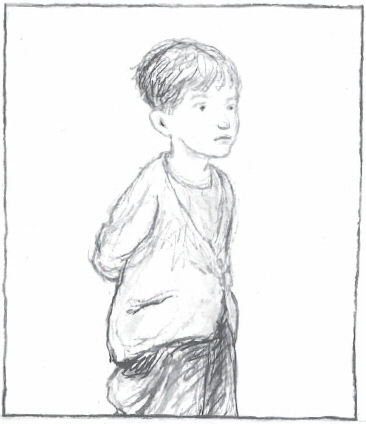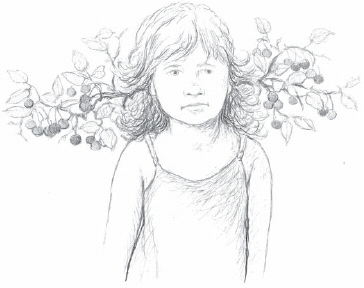Ordinary Sins (4 page)
Authors: Jim Heynen

The bees went on buzzing in their usual way since, for them, this was a very busy time of the year.

The worrier was the one who yelled Be careful! when others bounced merrily down the steps to the beach. When she used a Sani-Can, she worried that everything in her pockets would fall into the disgusting recesses of the chemical sewageâor that when she did sit down she would contract avian flu or mad cow disease or the swine flu or herpes or crab liceâor at least be bitten by a lurking brown recluse spider. At home she worried about everyone's schedules and appointments. She worried about leaves filling the gutters and about the nutritional value of food in the refrigerator.
Recently she had come to resent the fact that she was the one who always had to do the worrying. Why couldn't someone else worry about the directions to the airport? Why couldn't someone else worry about money for the toll bridge or proof-of-insurance papers in the glove compartment?
Her biggest worry was that if she didn't do the worrying no one would take up the worrying role and the world would fall to pieces. Chaos. Bedlam. That would teach all the slackers to take up some of the worrying responsibility! In the meantime, she worried about the fact that no one else was signing up for the worrying role.
Worry-wrinkles burrowed deeper and deeper into her brow while the world around her somehow survived in spite of itself. Still, she had to believe the slackers had a heart, that some part of them appreciated what she did. They must have taken comfort in knowing the bills were paid. They must have felt grateful that someone was sniffing for gas leaks near the stove, and checking the carbon monoxide in the bedrooms, and the lead content of the soil in the tomato patch, and the radon level in the basement! When they went to sleep at night, they must have been
thanking her in their hearts, knowing that water and rations and candles and two-way radios and gas masks and life vests and fire extinguishers and radiation shields had been stashed away in case an earthquake or tornado or flood or terrorist attack should suddenly be upon them all from god-knows-where. But what about the neighbors? she wondered. What did she really know about them?
She was sixty-two and widowed. Church people did not recognize her, but people at the animal shelter did. People at the shopping mall did not recognize her, but people at the library did. In this woman's life, there were more books than traffic lights, more cats than cell phones, more vegetables than credit cards.
In appearance, she looked ordinary in her blue denim jeans and work shirt, her graying hair wrapped tidily at the back of her neck. Her hands had the size and strength of a laborer's, but her smile had a gentle sweetness. She did not startle easily, though she moved through the world with a smooth swiftness, with a confidence that was not aggressive.
She seemed neither lonely nor gregarious. She seemed neither indifferent nor friendly. Still, some curious and good people wondered if she was all right. When they asked her, she said she had what she needed. When they gave her gifts, she accepted but offered more in return than what she had been given.
She had neither answers nor questions for anyone. If she had strong opinions, she didn't offer them. If she had worries, she didn't share them. Those who came near her felt a peacefulness spreading around her. She was like a soft cloud passing overhead.
This man had a peculiar resemblance to a pig. A Berkshire, actually, with oddly pointy ears and a squeezed snout. When he spoke, it was like a ventriloquist sending a human voice through the head of a Berkshire pig.
Already in junior high, classmates had taunted him with
oink oink
, so he knew very early what his life would be about. Later, after he had made his way through college and into reclusive work as a laboratory technician, there were still times when he had to appear in public. At first, when strangers stared at him on the street, he'd turn away, but he learned that he looked as much like a Berkshire pig in profile as he did head-on. He practiced a smile that he hoped would distort his features, but this made him look like a cartoon of a happy pig.
Ridicule, rejectionâand the face of a pig! Why didn't he lash out at the world? Why didn't he kill somebody, maybe himself?
In spite of his liability, the man was very intelligent, quite brilliant, in fact. Perhaps it was through careful analysis of his situation that he decided his solution lay in assertive goodwill. Perhaps it went deeper than that into the mysterious recesses of whatever it is that makes a man what he is. In any case, he decided that instead of becoming bitter, he would become sweet. That was his goal. He would be sweetâand stylish. He wore a pinstriped suit and a jaunty white hat in public, and he spoke in a gentlemanly fashion. And always with a smile.
The strange combination of his endearing cordiality and pig face fascinated people.
I know, he's weird looking, but what a sweet person!
I thought he'd be shy with that face of his, but look what he gave me!
He's really quite delightful once you get to know him. And such a gentleman.
An extraordinarily attractive woman found him irresistible. He's not like the others, she said. He is the first man who is interested in the part of me that doesn't greet your eye.
Give me a break, said a jealous cynic. The guy's got the face of a pig!
Today the pig-faced man and the beautiful woman are happily married. For reasons they don't disclose, they have decided not to have children of their own, but they have something that makes many ordinary couples jealous.
The baby decided to cry in public. She was at that blissful stage before words were needed to create a policy. She didn't have words, but she did have a policy. For nearly a year she had taken the matter under nonverbal consideration and had decided, without saying so, that actions spoke louder than the babble she heard around her. She listened to the grown-up babble around her and witnessed how talking was getting no one anywhere.
Crying was a reasonable alternative. She test-marketed her nonverbal deduction in supermarkets and restaurants. Leading indicators pointed in one direction: Cry in public!
Crying in public was bliss. It scrambled people more than pulling thirty books off a bookshelf. It made their faces light up like rain on the sidewalk. Crying in public worked. If a bit of a good thing worked so well, how much better would an abundance of a good thing be? She resolved to work on her policy until she had it right.
Crying at the family reunion photo session one day was nothing compared to the next day at the airport. She wailed and screamed until a whole concourse of men and women and ageless genderless beings recoiled in nonverbal submission. More than submitting, some were transformed. An announcer unearthed a smile, while a janitor swept up his remnants of pity. A lethargic clerk declared early departure. A man in a pinstriped suit inquired about the convenience of buses.
At the airport the baby cried as if the sky were the limit. Cried to the escalators, the baggage carts. She cried to the metal detectors and the boarding ramp tunnels. She cried to the seat belts and tray tables. She cried to the televised instructions for safety. She cried until the desperate flight attendants brought out the toys, the ridiculous non-chokable toys. Toysâand then candy.
Would this candy be all right? they asked the mother.
The mother, already sagging into herself, nodded weakly. The attendants handed the magical red, green, and blue sweets to silence the siren of wailing. But what's candy to an artist? To one who has been transfixed by the glory of being one with her work? Crying in public! The resonant joy of screaming and wailing.
But look: whose face is that submitting above her? Whose eyes are those filling with tears? Whose trembling lip? Is this the final reward of practice, the gift of these deepening wrinkles of fear and regret? For these, above all, the baby is crying in public.
This mother was so loving, so caring, so adoring, so gentle and considerateâand so encouraging and supportive that her son did not have the slightest idea what evil was. The little boy took such unreserved pleasure in the world that he acquired an expression so sweetly placid that neighboring parents who came into his presence cowered with guilt. Or resented him: He's like a cake with too much frosting.

Then one day the good mother brought her son to daycare.
For this wonderful smiling little boy, going to daycare was like a sparrow flying into a plate-glass window. During his first hour he did not see the gentle hands offering the colorful jingling toys, he did not see the excited face every time he stacked his blocks more than three bricks high. Instead, he felt the small claw-like fingers jerking the squeezy bug from his grasp to the accompanying snarl of MINE!
Is this the same universe into which the angels of plenty have thus far sustained me on wings of mercy through the land of milk and honey?
the little boy wondered.
Or is this but an illusory twinge of misery that I have heretofore known to be nothing but the bell that beckons the abundance back into the abode of my pleasure? Is the cloud of glory I have known, that babbling brook of good fortune, but a passing fantasy before the veil is lifted to reveal the cruel language of take? Oh, woe, ye energies of adversity, is this all? all?
the little boy asked of the crumbling universe around him.
If you don't stop eating so many cherries, cherries will start growing out of your ears, said the mother.
Eating cherries made the girl happy, and the more cherries she ate, the happier she felt.
Why don't you listen to me? said the mother, but the mother did not scold very loudly.
That afternoon the girl ate every cherry from a whole branch. She went to bed singing and with cherry stains on her lips and hands.
The mother scowled but did not scold her again.
The next morning the girl woke with an itch in her ears. She should have known this was a warning sign, but she just scratched her ears and went outside to start on a new branch of the cherry tree.

The mother saw the girl stuffing her cheeks with cherries. My goodness! she said. What is all this cherry eating going to lead to?